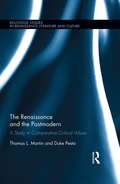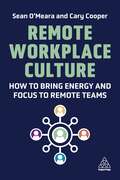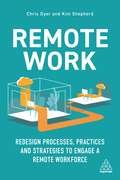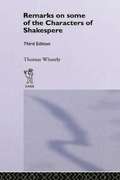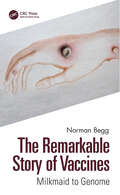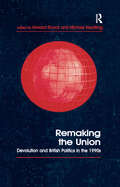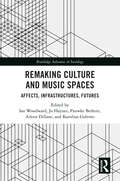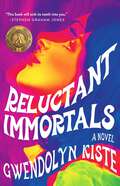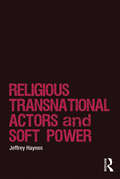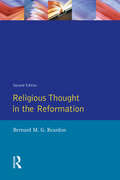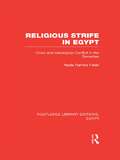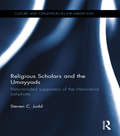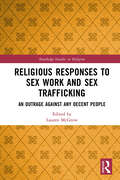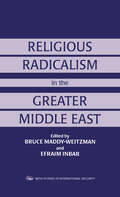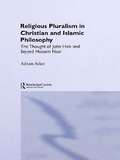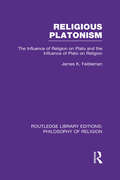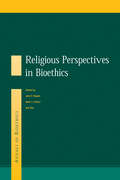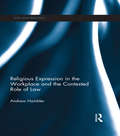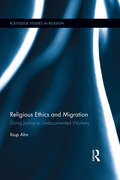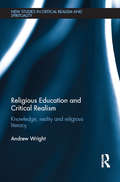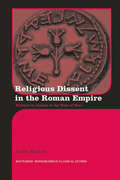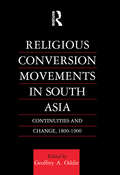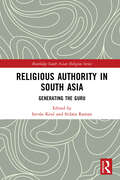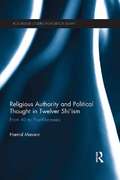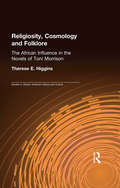Special Collections
Benetech’s Global Certified Accessible Titles
Description: Benetech’s GCA program is the first independent third-party EPUB certification to verify ebook accessibility. By creating content that is born accessible, publishers can meet the needs of all readers. Learn more: https://bornaccessible.benetech.org/
- Table View
- List View
The Renaissance and the Postmodern
by Thomas L Martin and Duke PestaThe Renaissance and the Postmodern reconsiders postmodern readings of Renaissance texts by engaging in a dialectics the authors call comparative critical values. Rather than concede the contemporary hierarchy of theory over literature, the book takes the novel approach of consulting major Renaissance writers about the values at work in postmodern representations of early modern culture. As criticism seeks new directions and takes new forms, insufficient attention has been paid to the literary and philosophical values won and lost in the exchanges. One result is that the way we understand the logical connections, the literary textures, and the philosophical impulses that make up the literature of writers like Spenser, Shakespeare, and Milton has fundamentally changed. Examining theoretical debates now in light of polemical controversies then, the book goes beyond earlier studies in that it systematically examines the effects of these newer critical approaches across their materialist, historicist, deconstructive, and psychoanalytic manifestations. Bringing gravity and focus to this question of critical continuities and discontinuities, each chapter counterposes one major Renaissance voice with a postmodern one to probe these issues and with them the value of the cultural past. As voices on both sides of the historical divide illuminate key differences between the Renaissance and the Postmodern, a critical model emerges from the book to re-engage this period’s humane literature in a contemporary context with intellectual rigor and a renewed sense of cultural enrichment.
Remote Workplace Culture
by Cary Cooper and Sean O'MearaThe way we work has changed and a strong, supportive company culture is key for success. When employees work remotely, even occasionally, HR professionals and business leaders need to think differently.Practitioners now need to motivate their workforce, support talent development, ensure an inclusive environment and protect their employees' mental health, all without being in the same physical space. A strong and effective company culture that is built specifically with this purpose in mind is crucial. Remote Workplace Culture is a practical guide that shows how to achieve this and explains why simply replicating what used to happen in the office in a virtual environment doesn't work. This book shows how a strong culture for remote, hybrid and flexible working helps attract the best talent, whether this is nationally or globally and explains how to prioritize inclusion. There is also specific guidance on wellbeing initiatives, how to replace social learning in a hybrid or remote working culture and how to avoid common pitfalls such as an overreliance on technology, the blurring of work/life boundaries and a misunderstanding of remote working etiquette. Supported by case studies from BBC, Salesforce, leading financial services brands and law firms, Remote Workplace Culture is essential reading for all HR professionals and business leaders needing to develop strong company culture in the new world of work.
Remote Work
by Chris Dyer and Kim ShepherdHow can I develop a team if they're not in the same place? How can I build a company culture that works for employees in an office, working at home and in co-work spaces? How can I maintain organizational oversight if I can't see my employees? Remote Work answers all these questions and more and provides guidance on how to build a successful remote working strategy that engages employees, allows them to perform to their full potential and improves business performance.The COVID-19 pandemic has put remote work into the business norm, but demand from employees to work remotely was already increasing, with a 2019 report stating that 34% of people surveyed would even take a pay cut if they could work remotely part of the time. HR professionals and business leaders need to address this demand to attract and retain the talent the business needs. Remote Work is written by two industry experts who have successfully transitioned their workforces to remote models. It provides essential guidance on how to implement policies, processes and strategies for remote working, including meeting types, measuring performance and creating virtual 'water cooler' environments.Featuring advice on technological solutions to adapting processes and driving engagement, this book also outlines the business benefits of a remote workforce including improved productivity and output and how it allows for faster expansion and execution. With insights from leading experts such as Marshall Goldsmith and case studies from Cornerstone OnDemand, Buffer and United States Marine Corps, Remote Work is essential reading now that increased home and flexible working is here to stay.
Remarks on Some of the Characters of Shakespeare
by Thomas WhatelyFirst published in 1970. Routledge is an imprint of Taylor & Francis, an informa company.
The Remarkable Story of Vaccines
by Norman BeggThis remarkable book tells you everything you need to know about vaccines. Having nearly 40 years’ experience of the subject, the author covers the history of vaccines, how they work, how research is carried out, their safety, how they are used in society, the inside track on COVID-19 and what the future holds. It is a deeply personal account, with anecdotes involving a cow called Blossom, a hospital in the Caribbean, a crocodile-infested lake in Malawi, an encounter with Russian soldiers in Prague and many others. An A-to-Z section covers every vaccine from Anthrax to Yellow Fever. It will educate, entertain and enlighten the vaccine scientific community and public health practitioners. Key Features• Explores a highly topical concept of vaccines in a comprehensive and easy-to-read manner• Engages readers with relatable and interesting anecdotes • Provides a balanced, factual counter to the huge amount of current vaccine misinformation
Remaking the Union
by Michael Keating and Howard ElcockThis volume addresses the issues arising from the recent devolution referenda by exploring the historical development of the proposals, the importance of national and regional identities, the changing policies of the political parties and the approaches of business and other major groups towards devolution. It also looks at the impact on electoral reform coming from the proposal that proportional representation be used to elect the regional assemblies and how the new assemblies are to be financed. Finally the book discusses the implications of a devolved British state where different countries and regions achieve different levels of autonomy at different paces.
Remaking Culture and Music Spaces
by Ian Woodward, Jo Haynes, Pauwke Berkers, Aileen Dillane, and Karolina GolemoThis collection analyses the remaking of culture and music spaces during the ongoing COVID-19 pandemic. Its central focus is how cultural producers negotiated radically disrupted and uncertain conditions by creating, designing, and curating new objects and events, and through making alternative combinations of practices and spaces. By examining contexts and practices of remaking culture and music, it goes beyond being a chronicle of how the pandemic disrupted cultural life and livelihoods. The book also raises crucial questions about the forms and dynamics of post-pandemic spaces of culture and music. Main themes include the affective and embodied dimensions that shape the experience, organisation, and representation of cultural and musical activity; the restructuring of industries and practices of work and cultural production; the transformation of spaces of cultural expression and community; and the uncertainty and resilience of future culture and music. This collection will be instrumental for researchers, practitioners, and students studying the spatial, material, and affective dimensions of cultural production in the fields of cultural sociology, cultural and creative industries research, festival and event studies, and music studies. Its interdisciplinary nature makes it beneficial reading for anyone interested in what has happened to culture and music during the global pandemic and beyond.
Reluctant Immortals
by Gwendolyn Kiste2023 Lambda Literary Award Winner 2023 Bram Stoker Award Finalist for Superior Achievement in a Novel For fans of Mexican Gothic, from three-time Bram Stoker Award–winning author Gwendolyn Kiste comes a novel inspired by the untold stories of forgotten women in classic literature—from Lucy Westnera, a victim of Stoker&’s Dracula, and Bertha Mason, Mr. Rochester&’s attic-bound wife in Charlotte Brontë&’s Jane Eyre—as they band together to combat the toxic men bent on destroying their lives, set against the backdrop of the Summer of Love, Haight-Ashbury, 1967.Reluctant Immortals is a historical horror novel that looks at two men of classic literature, Dracula and Mr. Rochester, and the two women who survived them, Bertha and Lucy, who are now undead immortals residing in Los Angeles in 1967 when Dracula and Rochester make a shocking return in the Haight-Ashbury district of San Francisco. Combining elements of historical and gothic fiction with a modern perspective, in a tale of love and betrayal and coercion, Reluctant Immortals is the lyrical and harrowing journey of two women from classic literature as they bravely claim their own destiny in a man&’s world.
Religious Transnational Actors and Soft Power
by Jeffrey HaynesHaynes looks at religious transnational actors in the context of international relations, with a focus on both security and order. With renewed scholarly interest in the involvement of religion in international relations, many observers and scholars have found this move unexpected because it challenges conventional wisdom about the nature and long-term historical impact of secularisation. The 'return' of religion to international relations necessarily involves deprivatisation. Recent challenges to international security and order emanate from various entities, notably 'extremists', people often said to be 'excluded' from the benefits of globalisation for reasons of culture, history and geography. This study looks at the dynamics of this new religious pluralism as it influences the global political landscape. Several specific transnational religious actors are examined in the chapters including: American Evangelical Protestants, Roman Catholics, the Organisation of the Islamic Conference, Sunni extremist groups (al Qaeda and Lashkar-e-Taiba), and Shia transnational networks. While varying widely in what they seek to achieve, they also share an important characteristic: each seeks to use religious soft power to advance their interests. In sum, these religious transnational actors all wish to see the spread and development of certain values and norms, which impact on international security and order.
Religious Thought in the Reformation
by Bernard M. ReardonMost general accounts of the reformation concentrate on its events and personalities while recent scholarship has been largely devoted to its social and economic consequences. Benard Reardon's famous book has been designed specifically to reassert the role of religion in the study of reformation history and make the theological issues and arguments that fuelled it accessible to non-specialists today.
Religious Strife in Egypt
by Nadia Ramsis FarahThis critical analysis investigates the causes that brought about one of the most tumultuous periods in modern Egyptian history – the clashes between the Muslims and Copts during the 1970s. A unique retrospective, it features probing interviews with Egyptian intellectuals, writers, political and religious leaders, as well as common citizens from both the Muslim and Copt communities. Within a framework of economic, political and ideological factors, Nadia Ramsis Farah is able to synthesize a compelling portrait of a troubled national conscience in the face of religious strife. First published 1986.
Religious Scholars and the Umayyads
by Steven JuddReligious Scholars and the Umayyads analyzes legal and theological developments during the Marwānid period (64/684--132/750), focusing on religious scholars who supported the Umayyads. Their scholarly network extended across several generations and significantly influenced the development of the Islamic faith. Umayyad qādòīs, who represented the intersection of religious authority and imperial power, were particularly important. This book challenges the long-standing paradigm that the emerging Muslim faith was shaped by religious dissenters who were hostile to the Umayyads. A prosopographical analysis of Umayyad-era scholars demonstrates that piety and opposition were not necessarily synonymous. Reputable scholars served as qādòīs, tutors and advisors to Umayyad caliphs and governors. Their religious credentials were untarnished by their association with the Umayyads and they appear prominently in later hòadīth collections and fiqh works. This historiographical study demonstrates that excessive reliance on al-Tòabarī’s chronicle has distorted the image of the Umayyads. Alternatively, biographical sources produced by later hòadīth scholars reveal a rich tradition of Umayyad-era religious scholarship that undermines al-Tòabarī’s assumptions. Offering a better understanding of early Islamic religious development, this book is a valuable resource for students and researchers in the fields of Islamic history, Islamic legal studies and Arabic historiography.
Religious Responses to Sex Work and Sex Trafficking
by Lauren McGrowThis book examines the history, theological beliefs and current contextual practices of faith-based NGOs who work in the area of human trafficking that involves the sex industry. There are hundreds of religious organizations around the globe who minister with human trafficking survivors and sex workers, but what is really happening on the ground and how do theological beliefs support a faith-based response? Many of these groups represent their work as a cosmic battle against evil forces, yet important structural critiques are ignored in the urgency to rescue women and children. Using perspectives from both NGO staff and sex workers, an interdisciplinary panel of contributors examine specific organizations, highlight marginalized voices, and analyze undergirding methodologies. In doing so, the authors provide clear critiques and establish best practice guidelines for faith-based NGOs and future religious leaders, affirming an intersection of justice based upon critical reflection and careful action. This book addresses with nuance an important topic that is often over-simplified. It will, therefore, be of great interest to scholars studying the interaction of religion to sex work and human trafficking, as well as academics of religious studies and theology more generally.
Religious Radicalism in the Greater Middle East
by Bruce Maddy-Weitzman and Efraim InbarThis collection offers a political analysis of religious radicalism in the Greater Middle East - comprising the Middle East, Central Asia and North Africa. The contributors present various conceptual perspectives including international relations, Middle East studies and political sociology.
Religious Pluralism in Christian and Islamic Philosophy
by Adnan AslanThe philosophy of religion and theology are related to the culture in which they have developed. These disciplines provide a source of values and vision to the cultures of which they are part, while at the same time they are delimited and defined by their cultures.This book compares the ideas of two contemporary philosophers, John Hick and Seyyed Hossein Nasr, on the issues of religion, religions, the concept of the ultimate reality, and the notion of sacred knowledge.On a broader level, it compares two world-views: the one formed by Western Christian culture, which is religious in intention but secular in essence; the other Islamic, formed through the assimilation of traditional wisdom, which is turned against the norms of secular culture and is thus religious both in intention and essence.
Religious Platonism
by James Kern FeiblemanIn Plato’s Laws is the earliest surviving fully developed cosmological argument. His influence on the philosophy of religion is wide ranging and this book examines both that and the influence of religion on Plato. Central to Plato’s thought is the theory of forms, which holds that there exists a realm of forms, perfect ideals of which things in this world are but imperfect copies. In this book, originally published in 1959, Feibleman finds two diverse strands in Plato’s philosophy: an idealism centered upon the Forms denying full ontological status to the realm of becoming, and a moderate realism granting actuality equal reality with Forms. For each strand Plato developed a conception of religion: a supernatural one derived from Orphism, and a naturalistic religion revering the traditional Olympian deities.
Religious Perspectives on Bioethics
by Mark CherryFirst published in 2004. Routledge is an imprint of Taylor & Francis, an informa company.
Religious Expression in the Workplace and the Contested Role of Law
by Andrew HamblerThe workplace is a key forum in which the issue of religion and its position in the public sphere is under debate. Desires to observe and express religious beliefs in the workplace can introduce conflict between employees and employers. This book addresses the role the law plays in the resolution of these potential conflicts. The book considers the definition and underlying motives of religious expression, and explores the different ways it may impact the workplace. Andrew Hambler identifies principled responses to workplace religious expression within a liberal state and compares this to the law applying in England and Wales and its interpretation by courts and tribunals. The book determines the extent to which freedom of religious expression for the individual enjoys legal protection in the workplace in England and Wales, and asks whether there is a case for changing the law to strengthen that protection. The book will be of great use and interest to scholars and students of religion and the law, employment law, and religion and human rights.
Religious Ethics and Migration
by Ilsup AhnWhat does it mean to provide justice for undocumented workers who have been living among us without proper legal documentation? How can we do justice to the undocumented migrants who have been doing the low-skilled, low-paid jobs unwanted by citizens? Why should we even try to do justice for people who violate the laws of the society? Religious Ethics and Migration: Doing Justice to Undocumented Workers addresses these questions from a distinctive religious ethical perspective: the Christian theology of forgiveness and radical hospitality. In answering these questions, the author employs in-depth interdisciplinary dialogues with other relevant disciplines such as immigration history, global economics, political science, legal philosophy, and social theory. He argues that the political appropriation of a Christian theology of forgiveness and the radical hospitality modeled after it are the most practical and justifiable solutions to the current immigration crisis in North America. Critical and interdisciplinary in its approach, this book offers a unique, comprehensive, and balanced perspective regarding the urgent immigration crisis.
Religious Education and Critical Realism
by Andrew WrightReligious Education and Critical Realism: Knowledge, Reality and Religious Literacy seeks to bring the enterprise of religious education in schools, colleges and universities into conversation with the philosophy of Critical Realism. This book addresses the problem, not of the substance of our primal beliefs about the ultimate nature of reality and our place in the ultimate order-of-things, but of the process through which we might attend to questions of substance in more attentive, reasonable, responsible and intelligent ways. This book unpacks the impact of modern and post-modern thought on key topics whilst also generating a new critically realistic vision. Offering an account of the relationship between Religious Education and Critical Realism, this book is essential reading for students, scholars and practitioners interested in philosophy, theology and education.
Religious Dissent in the Roman Empire
by Vasily RudichReligious Dissent in the Roman Empire is the third installment in Vasily Rudich’s trilogy on the psychology of discontent in the Roman Empire at the time of Nero. Unlike his earlier books, it deals not with political dissidence, but with religious dissent, especially in its violent form. Against the broad background of Second Temple Judaism and Judaea’s history under Rome’s rule, Rudich discusses various manifestations of religious dissent as distinct from the mainstream beliefs and directed against both the foreign occupier and the priestly establishment. This book offers the methodological framework for the analysis of the religious dissent mindset, which it considers a recurrent historical phenomenon that may play a major role in different periods and cultures. In this respect, its findings are also relevant to the rise of religious violence in the world today and provide further insights into its persistent motives and paradigms. Religious Dissent in the Roman Empire is an important study for people interested in Roman and Jewish history, religious psychology and religious extremism, cultural interaction and the roots of violence.
Religious Conversion Movements in South Asia
by Geoffrey OddieThis text examines examples of religious conversion throughout South Asia including: Processes of Conversion of Christianity in 19th Century NW IndiaIslamic Conversion in South IndiaKartabhaja Converts to Evangelical Christianity in BengalCentral Kerala Dalit ConversionFrench Mission and Mass MovementsConversion and Non-Conversion Experiences; and more. This book is a significant addition to the growing tradition of scholarship on religious conversion and a valuable resource for scholars and students who are interested in religious, social, and cultural developments of South Asia.
Religious Authority in South Asia
by István Keul and Srilata RamanThis book focuses on genealogies of religious authority in South Asia, examining the figure of the guru in narrative texts, polemical tracts, hagiographies, histories, in contemporary devotional communities, New Age spiritual movements and global guru organizations. Experts in the field present reflections on historically specific contexts in which a guru comes into being, becomes part of a community, is venerated, challenged or repudiated, generates a new canon, remains unique with no clear succession or establishes a succession in which charisma is routinized. The guru emerges and is sustained and routinized from the nexus of guruship, narratives, performances and community. The contributors to the book examine this nexus at specific historical moments with all their elements of change and contingency. The book will be of interest to scholars in the field of South Asian studies, the study of religions and cultural studies.
Religious Authority and Political Thought in Twelver Shi'ism
by Hamid MavaniRanging from the time of the infallible Imams, to the contemporary era, this book provides a comprehensive overview of Shi’i religious and political authority, focusing on Iran and Lebanon, without limiting the discourse to Khomeini’s version of an Islamic State. Utilising untapped Arabic and Persian sources, Hamid Mavani provides a detailed, nuanced, and diverse theoretical discussion on the doctrine of leadership (Imamate) in Shi’ism from traditional, theological, philosophical, and mystical perspectives. This theoretical discussion becomes the foundation for an analysis of the transmission of the Twelfth Imam’s religious and political authority vis-á-vis the jurists during his Greater Occultation. Bringing the often overlooked diversity within the Shi’i tradition into sharp focus, Religious Authority and Political Thought in Twelver Shi’ism discusses what constitutes an Islamic state, if there is such a notion as an Islamic state. Hamid Mavani further explores the possibility of creating a space for secularity, facilitating a separation between religion and state, and ensuring equal rights for all. This book argues that such a development is only possible if there is a rehabilitation of ijtihad. If this were to materialise modern religious, social, economic, political, and cultural challenges could be addressed more successfully. This book will be of use to scholars and students with interests ranging from Politics, to Religion, to Middle East Studies.
Religiosity, Cosmology and Folklore
by Therese E. HigginsFirst published in 2003. Routledge is an imprint of Taylor & Francis, an informa company.
